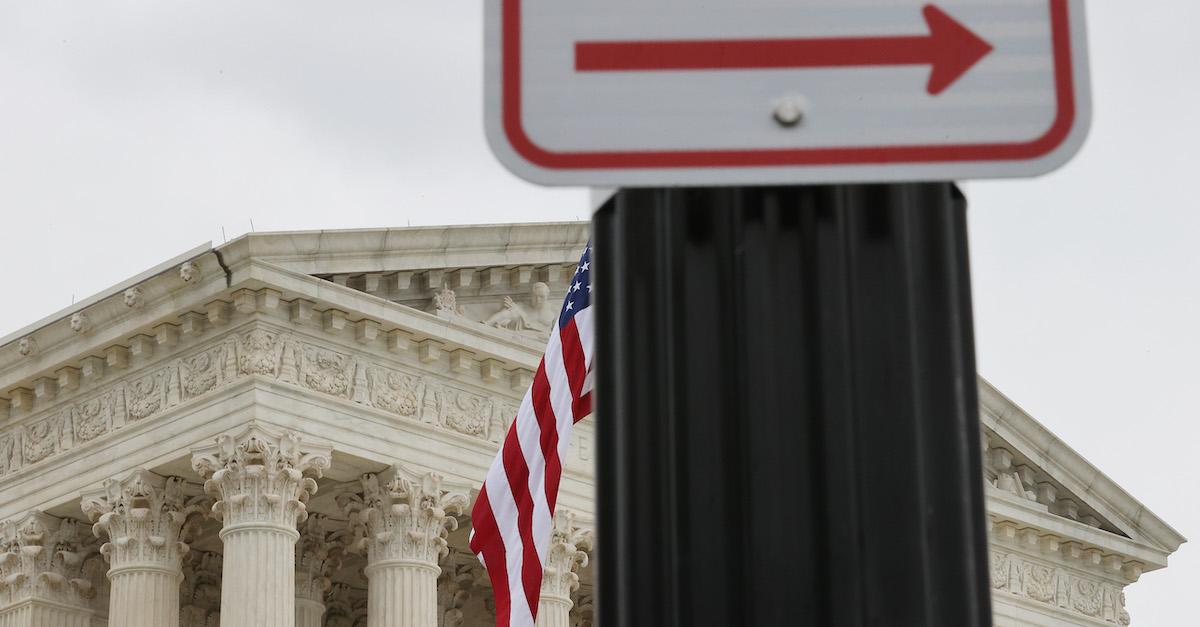
The Biden administration’s COVID-19 vaccine mandate for healthcare workers may be headed toward a high court chopping block, lopsided questioning from the Supreme Court’s conservative majority suggests.
At the outset, Justice Clarence Thomas grilled U.S. Principal Deputy Solicitor General Brian Fletcher about the statutory authority cited by the administration–specifically the Department of Health and Human Services–to support the vaccine mandate. The attorney’s response to an initial question appeared to baffle Thomas, who said he didn’t “understand” what Fletcher was saying. The government lawyer pressed on, explaining that the administration was using a general rule-making power outlined in Medicare and Medicaid law as well as separate laws specific to each of the kinds of providers covered by the mandate.
“Has that been used to require vaccinations in the past?” Thomas asked Fletcher, who conceded it had not.
Thomas insisted, against the administration’s repeated protests to the contrary, that the healthcare mandate significantly relied on that previously cited general administrative law. And, in framing his attack on the mandate as a “curious” question, the justice also mused those vaccines themselves “could have significant health consequences.”
Chief Justice John Roberts appeared to attempt to throw Fletcher a quick lifeline by asking him whether the present case was closer than the previous case heard by the nation’s high court.
“Counsel, in which case is the relationship between the agency closer to the COVID-19 danger?” he asked. “In this CMS case that you’re arguing now? Or in the OSHA case that your boss just finished arguing?”
During oral arguments in the other COVID-related case, the six-strong conservative majority also appeared primed to invalidate the Biden administration’s workplace mandate for COVID-19 vaccines or testing. Some observers, like legal journalist Mike Sacks, viewed that likely outcome as an expression of longstanding opposition the Occupational Safety and Health Administration itself.
Fletcher ducked a direct answer to the justice’s question, leaving Roberts to say he “thought” Fletcher might have said the salience of the current case was because “we’re dealing here, in this case, with healthcare” and that, insofar as a “close connection” could be compared and contrasted among the cases, “it would surely be between a health threat like COVID-19 and the government’s health care.”
Justice Sonia Sotomayor noted, in comments signaling her inclination to uphold the mandate, that the case wasn’t about any kind of police power asserted by the federal government, but rather Spending Clause-related litigation. Under typical understandings of that power, Sotomayor explained, “the government has more power to define where it wants to spend its money.”
Justice Samuel Alito quickly picked up on that line of questioning, asking whether or not the states had “clear notice” that by accepting Medicaid funds they would “be subject to” vaccination requirements. Fletcher hedged, saying that all states were, in fact, on notice that they were subject to general health and safety requirements “that the [HHS] secretary may adopt from time to time” before conceding that they “didn’t have specific notice about the vaccine requirement because it didn’t exist” until recently.
Just as Fletcher and Alito appeared to agree that several states generally have at least some form of notice about HHS rules, Alito changed the subject. He went on to say he thought the statutes relied on by the administration were really just “definitional” sections of federal law that don’t actually confer real power as opposed to “provisions that expressly authorize the secretary to promulgate regulations.”
The government argued that both sorts of statutes were being used to make the legal case but Alito appeared summarily unconvinced.
“Is there any limit to that power?” he asked, making his position obvious. “What could the [HHS] secretary–what, if anything, could the secretary not do if the secretary finds that something is necessary to protect the health and safety of people in those facilities?”
Other judges on the court’s right flank dug into similar lines.
“I find it difficult,” Justice Amy Coney Barrett said, picking up on prior skepticism expressed by her conservative colleagues. “Because the language of each of those statutes is different and not all of them reference health and safety.”
Justice Neil Gorsuch, for his part and ever-focused on the text, pointed to a section of the statute that, in his words, “contains an express limitation” on the government’s authority.
“Among other things it says, you know, the secretary shall not control the tenure of employees at covered health care facilities’ or their compensation or their selection,” Gorsuch said, paraphrasing a section of one the numerous statutes at issue in the case. “This effectively controls the employment of individuals at these health care facilities in a way that Congress specifically prohibited.”
And, though occasionally considered something of a swing justice, Justice Brett Kavanaugh appeared to show no inclination to act that way here, wondering out loud why the federal government has never mandated vaccines or “flu shots” in the past while some states have insisted upon such measures for health care workers.
The case, stylized as Biden v. Missouri, arises from two consolidated cases in the Show-Me State and Louisiana after lower courts enjoined the mandate from taking effect late last year.
[image via Chip Somodevilla/Getty Images]
Have a tip we should know? [email protected]